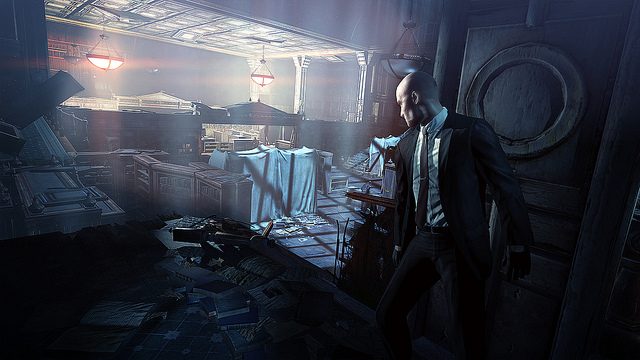
Hitman: Absolution was one of the most talked about games at E3 earlier this month after an impressive behind closed doors showing and the release of this atmospheric trailer. There is still plenty of mystery around Agent 47’s upcoming mission so I recently caught up with Tore Blystad, game director and Christian Eleverdam, gamplay director at IO Interactive to get some further intel.
How does it feel to be bringing Hitman back after such a long time away?
TB: It feels super great. Part of time was spent building a brand new engine from scratch. We looked at all the previous Hitman titles and said, “Okay, there’s a lot of DNA here, what do we want to improve?” We looked at everything, from Agent 47 himself – how does he move? what can he do? – to the AI. We had quite a few binary reactions in the old games, where if you got discovered it turned into a bit of a clumsy combat situation. We wanted to widen that a lot. Obviously we still have a lot of stealth elements in the game.
Let’s say you get discovered by a police officer. He won’t immediately try to shoot you, he’ll attempt to arrest you. This means that in Hitman: Absolution we have a bit of rubber-banding, a bit of leeway to try things out. You can back away, find a dark corner or try to disarm him.
We created a lot of different scenarios. So for example there’s a kind of hippies’ apartment which Agent 47 enters disguised as a police officer. These guys don’t like cops, so this disguise is not a good idea in there. But they won’t just attack you without warning. They’ll want to know why you’re there and warn you off. Of course, they might try to attack you, but that’s probably not going to end well for them.
Now, if you go in there dressed as Agent 47, they probably would allow you to be there, even though you’re trespassing and would arouse suspicion. There’s a lot for us to play around with.
So a lot of the experience will depend on you reacting to what’s going on around you?
CE: Yes, you need to play with your eyes open. Disguises play a big part here to alter how the game pans out in front of you. A lot of the disguises have their own attributes, and the Instinct system ties in there too. Instinct allows you to see potential challenges in real time. If you’re disguised and it’s cop versus cop then you can try to bluff them and sneak away to save ammo.
Is Instinct always available?
CE: No, Instinct is an economy. You have to earn it by doing the sorts of things a real hitman might do – by carrying out silent kills, successully concealing bodies and bluffing a large number of people, for example. You have to use it carefully on the most expert difficulty settings, while it’s more prevalent on the easier ones.
The demo we saw was set in a rain-lashed Chicago. Is the whole game set there?
TB: I can’t get into specifics there I’m afraid, but there are a lot of locations and Agent 47 will be collecting his air miles.
What’s the nature of Agent 47’s assignment this time?
TB: It’s a much more personal journey for Agent 47. He’s completely invested in the story, and we see an interesting turning point where he gets betrayed. This sets him off on a hunt for the truth, but, of course, it’s still very much about finding people and killing them.
There’s a real sense of non-playable characters’ micro-dramas happening all around you.
CE: Well an open world game needs to feel alive, so that’s what we’ve gone for here. The characters can do so many different things according to the situation. Along with the cinematic sequences, this has been the toughest thing for us to get right, hence us having to build our own brand new tool set and basically attack it from any angle.
If you take out the guy that was supposed to turn on the lights in a room, it changes the situation completely. Every action, however small, has its own consequence.
TB: We have a rookie cop character who has been called out with his colleagues to a library which Agent 47 is stalking round. This new guy is always getting told off by his sergeant, and you can actually distract him. He will go off and investigate before carrying on with his own little story. If you take a different path through the library, you can see his story unfold from a different perspective.
This allows you to play with your morals – you can kill the rookie without a second thought, or isolate his sergeant and kill him instead, giving the new guy a bit of a break. We really wanted to include a lot of this kind of stuff. Imagine playing through this big, dark library without this and it’s just a normal stealth game. It loses a defining Hitman characteristic. Nothing else has that. Whichever way you play it, it should always be entertaining.
Do you create the characters first, then build the game around them?
CE: It goes into a big jumble. Often we think of a cool disguise then devise a way to get it into the game, like the chicken suit in Hitman: Blood Money.
We sometimes think of the situation first then devise the characters to populate that – like the library full of cops. Pacing is always top priority, so anything that can add variety is a good thing because it makes the player think differently.
Who dreams up the various ways to assassinate people?
TB: We had a base of mechanics from Hitman: Blood Money that we started off with, and we added to that whatever people could come up with. Plus, many of the improvised weapons are location specific, so you wouldn’t find too many heavy books outside of the library.
So does that mean people from IO Interactive go home at night and sit there thinking up ingenious ways to kill people?
TB: Yeah! People come in the next day and go, “Hey! I had this great idea last night about pushing a cop off a ledge”, or whatever. Everyone’s a closet hitman.













Comments are closed.
35 Comments
Loading More Comments